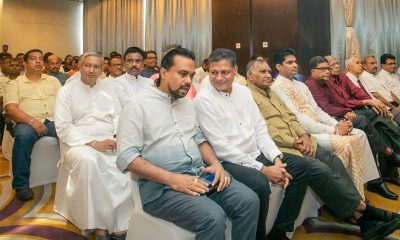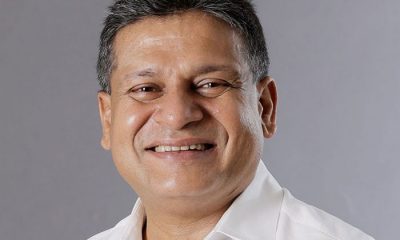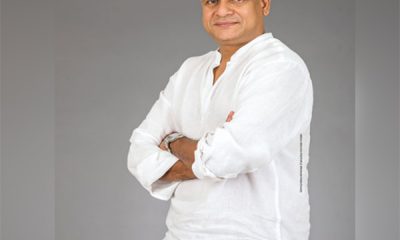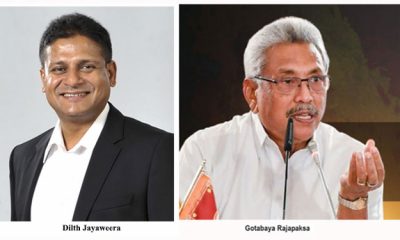Midweek Review
GR’s ouster: Another narrative
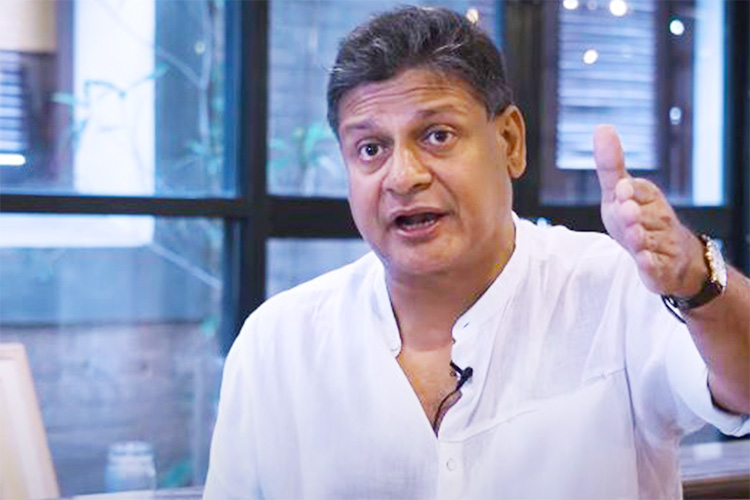
By Shamindra Ferdinando
Derana Chief Dilith Jayaweera says the Port City Colombo could have given Sri Lankan economy the turbo boost it required but, unfortunately, the powers that be failed to handle it properly though the country accepted the modern concept. The mega project was in line with contemporary global economy, therefore Sri Lanka’s move received global recognition, Jayaweera said, calling it a progressive economic decision.
But Sri Lanka missed the opportunity for want of a cohesive strategy as well as destructive party politics that dealt a severe blow to the flagship Chinese project, the top entrepreneur who does not shy away from speaking the truth, he said.
Jayaweera questioned the failure on the part of Sri Lanka to properly manage the Chinese flagship project, with national interest at heart, and burying petty party divisions, for the country’s sake. China launched the project in late 2014 as the country was heading for early presidential elections.
Having sabotaged the project, the then Yahapalana administration (2015-2019) went to the extent of ridiculing even the concept, thereby undermining a mega investment that could have laid the foundation to give a turbo boost to the country’s image, as well as its economy.
Their utterly irresponsible actions caused rapid erosion of investors’ confidence in the project, Jayaweera declared, and the decision to revisit a project, launched by the previous government, caused chaos. “Calls for renegotiation of the agreement resulted in inordinate delay in the implementation and the loss of investors,” Jayaweera said, declaring that the Colombo Port City was yet to receive a significant investment, since those deliberate interruptions. The Yahapalana action tainted the project as corrupt and denied investors’ confidence, hence the difficulties in attracting funds. Let me stress: “Sri Lanka couldn’t attract large scale investments because we ruined the project.”
Jayaweera said so, in an interview with The Island, at his posh office at T. B. Jayah Mawatha, a few days ago. The controversial businessman, widely believed to be one of the close associates of ousted President Gotabaya Rajapaksa, discussed a spate of issues, ranging from the formation of ‘Aramuna’ meant to strengthen the business environment with the focus on Small and Medium Enterprises (SMEs), collapse of the national economy, foreign relations and interventions, as well as the hand of a jealous Rajapaksa family, in the ruination of Gotabaya Rajapaksa, elected with an overwhelming majority of 6.9 mn votes.
BR-Dilith meet
Asked about course correction, attempted by him in 2021, as the country was heading rapidly towards economic catastrophe, Jayaweera said that he discussed the issue at hand with the then Finance Minister, Basil Rajapaksa, right there. Jayaweera said: “The Minister couldn’t comprehend the crisis, regardless of my efforts. In fact, Basil Rajapaksa took things lightly, very lightly. Perhaps, the Minister simply didn’t know the situation he was dealing with and the implications, in case the Rajapaksa government failed to address the growing cash flow problem.”
So was Basil part of the grand conspiracy to topple that government by playing dumb at such a crucial juncture?
Basil Rajapaksa was sworn in as the Finance Minister, on July 08, 2021, at the Presidential Secretariat. It was soon after his second entry to Parliament, on the National List, though the circumstances were vastly different.
The Rajapaksas amended the Constitution to accommodate the US, Sri Lanka dual citizen in Parliament in spite of strong opposition from a section of the ruling party. Vasudeva Nanayakkara, Wimal Weerawansa, Udaya Gammanpila and Gevindu Cumaratunga opposed the move. Their concerns were disregarded.
Asked what really had prompted Basil Rajapaksa to visit his spacious office, furnished much better than ministerial offices, Jayaweera explained how the President arranged for the meeting after he brought the impending crisis to the notice of the head of State. Jayaweera strongly maintained that those who had been around the President deliberately furnished him with utterly wrong estimates pertaining to the economic status. “There is absolutely no ambiguity regarding their despicable strategy. As a result of a spate of uninformed and hasty decisions, the country ended up bankrupt and at the mercy of the International Monetary Fund (IMF),” Jayaweera said.
Commenting on Opposition accusations that the government intended to launch a domestic debt restructuring process, having repeatedly assured the people it would not do so, Jayaweera pointed out that this was to be done at the behest of the IMF. Debt restructuring was certainly not a national requirement at the moment though the issue at hand is why Sri Lanka shouldn’t subject itself to a domestic debt restructuring if the country expected relief from bilateral and multilateral creditors.
IMF bailout package not a panacea
for all our ills
Jayaweera accepted the writer’s suggestion that a domestic debt restructuring was a fair condition laid down by the IMF to provide the USD 2.9 bn bailout package, to be made available over a period of four years. Sri Lanka received the first tranche of the package at the end of the third week of March this year.
Jayaweera stressed that the country, as a whole, should deliberate whether debt restructuring should take place at the IMF’s directive or in line with Sri Lanka’s overall response to the current economic challenges. The media and business tycoon underscored the responsibility on the part of the government, and all other stakeholders, to examine the impact of such an exercise on the economy with the focus on the money market and the banking sector. The stakeholders should be sensitive to the developments, in case a far reaching debt restructuring process was undertaken, Jayaweera said, calling for a dialogue on the contentious and possible consensus without imposing debt restructuring as a prerequisite.
Asked to compare the latest IMF bailout package and the 16 previous ones that Sri Lanka obtained from it, Jayaweera said those engaged in talks with the lending body as well as other creditors, should be extra cautious as the country was now in the worst possible situation. “On all previous occasions when we sought IMF interventions, the economy was in a much better condition. We were in a much more comfortable environment then. But we are in the worst possible situation, today.”
Jayaweera stressed the responsibility on the part of the government to be vigilant in ongoing talks with lending bodies and other creditors. The businessman quite rightly asserted that the country was in such a precarious situation and therefore it could become vulnerable to various machinations.
During the nearly 90-minute long interview, Jayaweera was not interrupted by calls on his hand phone or the intercom, though a smartly dressed woman brought a tall glass of iced tea for the writer. Sipping the delicious iced tea, with a straw, the writer asked whether President Gotabaya Rakapaksa inadvertently did something good by refusing to seek IMF intervention in 2020. Otherwise, the country would have obtained more loans to settle debt and interest and continued the farce, perhaps for another decade, and placed the economy in an even far worse situation, Jayaweera was told.
A smiling Derana Chief responded that perhaps the President’s intention was good though he was ill-informed of how to implement it. The self-made tycoon pointed out the failure on the part of the then administration have alternative arrangements, in place, to do away with the IMF assistance. The need to meet recurrent expenditure couldn’t have been ignored under any circumstances, Jayaweera said, squarely blaming the then Secretary to the President Dr. Punchi Banda Jayasundera, and Basil Rajapaksa, for the crisis. The duo had been so reckless in taking far-reaching decisions, Jayaweera said, claiming that he didn’t believe even a small vendor would have been so irresponsible. Jayaweera cited a highly controversial Cabinet decision to do away with a spate of taxes at the first meeting of the Cabinet-of-Ministers, in the last week of Nov, 2019, less than two weeks after the last presidential election. So it looks as if the die had already been cast to doom the Presidency of Gotabaya Rajapaksa from the word go.
The government never made contingency plans to recover the losses caused by that fateful decision. The Treasury is believed to have lost as much as Rs 600 billion per year due to the abolition of taxes.
Rating agencies deliver knockout blow
Jayaweera explained how international rating agencies downgraded the country due to the significant loss of income. Once rating agencies recognized a country as a badly managed economy, that economy rapidly lost opportunity to raise loans at reasonable interest rates, Jayaweera said, emphasizing that President Gotabaya Rajapaksa shouldn’t be faulted for believing that Sri Lanka could stop taking further loans. Jayaweera again stressed that Dr. PBJ and Basil Rajapaksa should accept the responsibility for their failure to manage the economy. Instead of taking remedial measures, the government challenged those rating agencies, he said.
When the writer pointed out that Basil Rajapaksa re-entered Parliament only in the first week of July 2021, Jayaweera hit back: “That was how you viewed the situation. But what really happened? Soon after Gotabaya Rajapaksa’s victory, Basil Rajapaksa and the clan appointed Dr. PBJ as the President’s Secretary. That was done to take over the management of the economy. In spite of Basil Rajapaksa not being a lawmaker at that time, he received the appointment as somebody who managed the economy from behind the scene. And Dr. PBJ, though only the Secretary to the President, got the de-facto control of the economy.”
We don’t for a moment question the capabilities of Dr. PBJ, the former Central Banker had been seconded to the Finance Ministry, even before the time R. Paskaralingam (Pandora Papers’ fame) was the Treasury Secretary in the Premadasa regime because of his capabilities and served virtually under all regimes before and thereafter as far as we can recall. Dr. PBJ also scored big by managing the economy deftly especially during the last phase of the war as Treasury Secretary and thereafter. But the question is did he double as an “economic hitman” as alleged by some.
Jayaweera accepted the writer’s suggestion that it would be better to assert that grouping took control of the economy than blaming an individual. Jayaweera alleged that the group took advantage of the then Prime Minister Mahinda Rajapaksa, who also served as the Finance Minister (Nov. 2019 to July 2021) as he was not in good health. Jayaweera explained how interested parties exploited the much deteriorated health of the former President, particularly periodic loss of memory. “I had no option but to take up this issue with President Gotabaya Rajapaksa. The President accepted the ugly truth.”
Jayaweera said that he sought a meeting with President Gotabaya Rajapaksa to discuss the forex crisis, about 20 months ago. Having explained the looming crisis on the basis of the widening gap between government income and expenditure,
Jayaweera had got involved in an argument with President Gotabaya over the latter’s accusation that the Derana Chief misinterpreted facts as he was in dispute with Dr. PBJ. “I denied that allegation, insisting that my assessment was entirely based on official figures, also made available to the President. The President regretted the situation but scolded me. But, three or four days later, the President called me again for a meeting. I was provided with a cash flow statement. I quickly pointed out how unrealistic the income column was.”
The President’s economic team quite conveniently failed to explain the impact of rising crude oil prices at that time. That lot provided the President with unsubstantiated and unrealistic figures therefore the decisions taken on such advice caused the crisis, Jayaweera said, referring to the silly bloated assessment of USD 6 bn from tourism, whereas we know not even one bn USD income was realistic, after the Easter carnage, followed by the unprecedented COVID-19 pandemic.
Jayaweera said that he contacted the President again as he couldn’t bear the impending catastrophe. Jayaweera recalled how President Gotabaya Rajapaksa suggested that he discuss the situation with Finance Minister Basil Rajapaksa and the meeting took place at the very place where we met last week.
Basil Rajapaksa’s simple dismissive reaction had caused fear and anxiety in the Derana Chief, especially pertaining to the direction of the national economy, Jayaweera said, adding that over dinner, too, he tried to convince the Finance Minister of the threat due to the frightening cash flow problem.
Jayaweera quoted Basil Rajapaksa as having declared that the public wouldn’t come to the streets to protest scarcity in goods though they demonstrate against high cost of living. “I suggested that fuel consumption should be cut by 50 percent. The need for a realistic pricing formula was also suggested. But, the Minister simply dismissed my suggestions. President Gotabaya Rajapaksa himself told me Basil Rajapaksa and Dr. PBJ managed the economy. Therefore, they couldn’t absolve themselves of the responsibility for the current crisis.”
Jayaweera didn’t mince his words when he alleged that President Gotabaya Rajapaksa’s first major fault was accepting the family nominee Dr. PBJ as the Presidential Secretary. The President did so in spite of knowing it would be the end of his presidency, Jayaweera said.
Aramuna
vision
In this context, ‘Aramuna’ that had been established years before the public protest campaign against the Rajapaksa administration, in March 2022, was making representations on behalf of the affected communities, Jayaweera said. When queried about the recent declaration in Jaffna that they should pursue talks with banks as a group to secure much needed relief, Jayaweera explained the discussions they had with top level management of state and private banks. “We are trying to obtain as much relief as possible. But, overwhelming challenges cannot be surmounted without political will,” Jayaweera said. The outspoken ‘Aramuna’ initiator found fault with the government for shrinking the economy. That was disastrous, Jayaweera said, comparing the current situation with that of a gravely ill person deprived of medicine.
Citing the deterioration in the construction industry as a case in point (From 10 percent of the GDP to just one percent), Jayaweera said that import restrictions badly affected the export sector for want of intermediary goods. Volatile foreign currency market undermined all sectors as they found it difficult to furnish a proper quotation.
Acknowledging that certain restrictions were necessary, Jayaweera, however ,insisted that it was the responsibility of the government to properly manage the crisis by ensuring the sectors which contributed to the growth of the GDP received the support they deserved.
Jayaweera emphasized that one of their key missions was to motivate what he called human capital. If human capital lost confidence a country could face catastrophic consequences, he said, pointing out that professionals and others alike wanted to migrate in the absence of a proper strategy. Obviously, they felt concerned and not sure whether the country could overcome the unprecedented mess, Jayaweera said.
“In response to the challenge, we intended to promote entrepreneurship among the population. But, it would be important at least now to recognize the shortcomings, failures, mismanagement and unproductive investments by way of loans,” he said.
Jayaweera explained how unbridled use of loans for consumption and not sufficient returns for investments contributed to the current mess while flaying the powers that be for failing to adopt course correction even after the declaration of bankruptcy.
Responding to another query, Jayaweera said that the latest IMF intervention, too, hadn’t been sought in line with strategy to uplift the country but simply as a reaction to the crisis. He declared that nothing had changed as the existing political party apparatus continued to do the same.
Jayaweera denied any similarity whatsoever between ‘Aramuna’ and Gotabaya Rajapaksa’s ‘Viyathmaga’ while insisting the former didn’t promote political strategy at all. Pointing out that at the time they established ‘Aramuna’, four years ago, it didn’t have a political outlook, Jayaweera explained in response to the current challenges, the outfit now operated on the premise that the issues at hand couldn’t be addressed without a ‘political solution.’
Asked whether ‘Aramuna’ would take a stand at the next national level election, particularly against the backdrop of the UNP propagating the possibility of presidential election before Local Government polls, the maverick businessman said that on the basis of a set of minimum conditions, meant to overcome national challenges, they would push for a consensus with most suitable party/alliance.
Need for infallible systems
Pointing out that the country suffered for want of infallible systems and recklessly having faith in people, Jayaweera was asked whether he believed in systems or politicians. This was raised on the basis of accommodating businessman Dhammika Perera on the SLPP National List, in early June 2022, and Ranil Wickremesinghe receiving appointment as President after entering Parliament on the National List, though rejected by the Colombo electorate. Jayaweera declared: “We need a system not a system change. We are in such an unstable situation, unless remedial measures were taken the country can be shut down overnight. That is the reality,” he said emphatically.
Jayaweera strongly denied the query whether he in any way influenced and benefited from the utterly reckless tax cut announced in Nov. 2019. “How could I benefit when that idiotic decision ruined our economy. What is the point in my enterprises receiving some benefits against the backdrop of economic annihilation? That decision cannot be justified under any circumstances,” Jayaweera said.
The Derana top honcho quoted the then Inland Revenue Chief having told him that there was no basis for assertion such tax cuts could trigger significant economic growth.
Jayaweera questioned the rationality in pushing for a new Anti-Terrorism law to replace the Prevention of Terrorism Act (PTA) at a time the government should fully concentrate on economic recovery programme. An irate Jayaweera said that the new anti-Terrorism law should be at the bottom of the list of priorities.
Commenting on the leasing of Hambantota port to China for a period of 99 years in 2017, during the Yahapalana administration, for USD 1.2 bn, Jayaweera said that shouldn’t have happened, under any circumstances.
The deal deprived Sri Lanka of its most strategic asset but USD 1.2 bn received was not even used to settle the loans procured from China for the building of the harbour.
Asked whether he supported constitutional restrictions imposed on the number of ministers (30) and non-cabinet ministers (40), Jayaweera ridiculed the concept. Such constitutional interventions had been made in response to a greedy political party system. The number of ministers should be entirely based on the requirement of the government of the day and certainly not to appease greedy lawmakers, Jayaweera said, asserting that the country could manage with a much smaller Cabinet if appointments were on a scientific basis. Jayaweera also dismissed the much-touted National Government concept, too, as a mechanism to appease a far larger number lawmakers by appointing an extra-large Cabinet.
The outspoken businessman, who does not fear to call a spade a spade, asserted that print, electronic and social media would have to re-examine overall strategy as their impact on the electorate, particularly the floating vote,would be much less in the developing political-economic-crisis. It would be a grave mistake to believe the electorate could be exploited the way they did before the 2022 explosion.
The indefinite postponement of Local Government polls has deprived the JVP of an opportunity to improve its vote. Pointing out that the JVP, at the moment had just three percent of the vote, Jayaweera said that even if it doubled that it wouldn’t make a big difference. But with the relatively improved ground conditions, the JVP couldn’t sustain its strategy, Jayaweera said.
The JVP based its campaign on the allegation that the economy collapsed due to Rajapaksa corruption. Against the erosion of JVP’s new support base, UNP leader Ranil Wickremesinghe has emerged stronger and acceptable to a section of the electorate, he observed.
Finally, The Island raised two vital questions (i) who would be the two major opposing parties at the next presidential or parliamentary polls and (ii) what should be our foreign policy whether to stand with China and Russia or Quad comprising the US, Japan, Australia and India.
Jayaweera asserted that the electorate would look at the two major alliances on the basis of their economic programmes. The better grouping would win but the electorate wouldn’t ignore the nationalistic views and those who voted for Gotabaya Rajapaksa at the last presidential election as a group remained a force to be reckoned with, Jayaweera said. In the current context, President Wickremesinghe could lead one alliance and the other spearheaded by the SJB. But, both camps essentially follow the same strategies pertaining to the economy et al. The issue at hand is whether President Wickremesinghe could follow the identical strategy while receiving the backing of the ‘Pohottuwa’ vote that represented the interests of what he called ‘jahikathwa’ kandawura.
Jayaweera warned the powers that be against taking sides in the continuing US-China battle. Stressing the pivotal importance in our relations with New Delhi, Sri Lanka couldn’t afford to pursue foreign policy strategy at China’s expense, Jayaweera said. The success of Sri Lanka’s short-medium and long term recovery depends on how the country manages foreign relations. Asked whether he backed signing of MCC and SOFA against the backdrop of entering into ACSA with the US in August 2017, Jayaweera said that as he said before there is no ‘yes’ or ‘no’ answer to that query, too. “We as a modern nation it is important for us to get into bilateral agreements. We need to evaluate the pros and cons of them along with a comprehensive country strategy and then decide.”
Midweek Review
House erupts over Met Chief’s 12 Nov unheeded warning about cyclone Ditwah
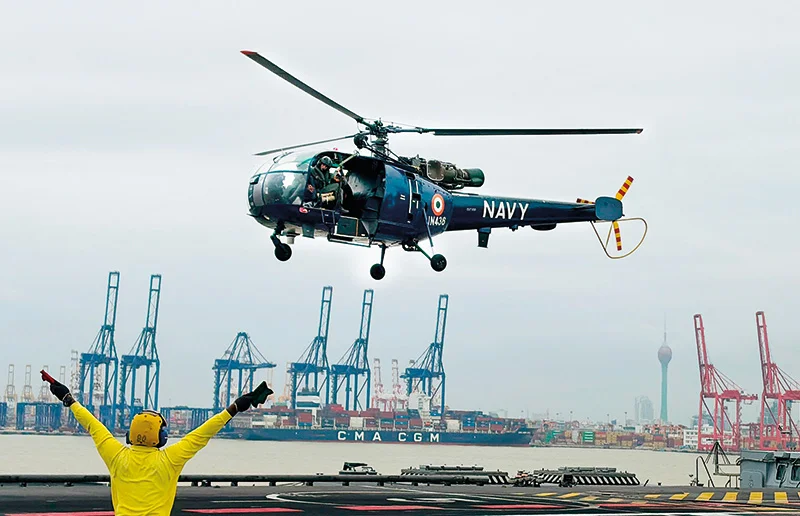
Pakistan arranged a series of C-130 humanitarian flights to transport the Urban Search and Rescue (USAR) team, fully equipped field hospitals, and approximately 100 tons of relief assistance. Pakistan, whose assistance during the war prevented the breaking up of Sri Lanka, also directed a Pakistan Navy Ship (PNS), that was here to participate in the International Fleet Review to mark Sri Lanka Navy’s 75th anniversary, to engage in humanitarian operations. The Pakistan High Commission here said that the vessel’s onboard helicopter was deployed for relief and rescue missions, in coordination with Sri Lankan Forces, extending crucial aerial support to affected areas. (At the time this edition went to press, Pakistan hasn’t been able to dispatch the aid aircraft due to India not granting sufficient time to carry out the movement, Pakistan HC in Colombo alleged. India earlier said that approval has been granted for Pakistan to fly over India)
The year 2025 ends with devastating loss of lives and property, both private and public, as a result of floods and landslides triggered by Cyclone Ditwah.
Social media erupted over accusations that the National People’s Power (NPP)government failed to issue a proper warning, in spite of the Director General of the Meteorology Department, Athula Karunanayaka, declaring the impending unprecedented danger.
Karunanayaka made the deadly prediction on 12 November on ‘Big Focus.’ He said so responding to ‘Big Focus’ presenter Kalindu Karunaratne.
Karunanayake didn’t mince his words when he warned of the impending catastrophe. The top official warned that the situation could take a turn for the worse on or after 14 November. Declaring that the threat could progress rapidly though it may not happen on 14 November, Katunanayake said at that moment he wouldn’t call the development a cyclone.
Cyclone Ditwah made landfall on 27 November, two weeks after DG Karunanayake’s warning.
Some compared the alleged lapse with the failure on the part of the Yahapalana administration to thwart the 2019 Easter Sunday carnage, though the powers that be received actionable intelligence.
The nearly one-hour long programme entirely dealt with the developing weather situation. The Director General of the Disaster Management Centre (DMC), Major General (retd.) Sampath Kotuwegoda, and scientist Imaya Ariyarathna of the National Building Research Organisation (NBRO) joined the discussion.
What really prompted ‘Big Focus’ to invite them for a discussion on weather at a time when much more interesting developments were taking place, with a section of the Opposition planning the Nugegoda protest. Let me emphasise that the Meteorology Department comes under the purview of the Ministry of Defence (MoD) and it works closely with the DMC. President Anura Kumara Dissanayake is the Minister of Defence, while his deputy is Major General (retd.) Aruna Jayasekera. The Secretary to the MoD is celebrated helicopter gunship pilot, Air Vice Marshal (retd.) Sampath Thuyakontha.
It would be pertinent to ask whether the Meteorology Department alerted the Defence Ministry, in writing, regarding the impending threat. Had DG Karunanayake been so sure of the developing threat shouldn’t he have advised the government immediately? In addition to DG Karunanayake, it would be necessary to inquire into the DMC’s response and that of NBRO as both organisations had been represented at the discussion.
In fact, the Metrology Chief should have advised the government of the developing situation before he appeared on ‘Big Focus.’ What did the Metrology Department, the DMC and NBRO do over the next 10 days before Cyclone Ditwah ravaged Sri Lanka?
Instead of demanding a Parliamentary Select Committee (PSC) to ascertain the overall failure of those responsible to act on available data, the main Opposition Samagi Jana Balawegaya (SJB) pursued a politically motivated agenda. Finally, the SJB forcefully raised the issues at hand in Parliament on 01 December. The government struggled to cope up with Opposition accusations.
A section of the Opposition sought to take political advantage of the developing crisis by demanding the cancellation of a national programme called the ‘Sri Lankan Day’, meant to foster unity and understanding among the country’s diverse communities and utilisation of the funds, allocated for that project, to provide urgently required assistance for the needy.
Buddhasasana, Religious and Cultural Affairs Ministry has been tasked with implementing that programme, which is scheduled to take place on 12, 13, and 14 December, 2025. The Opposition should have pressed both the government and DG Meteorology as to how specific warnings weren’t issued at least in the wake of the ‘Big Focus’ disclosure.
Political conspiracy
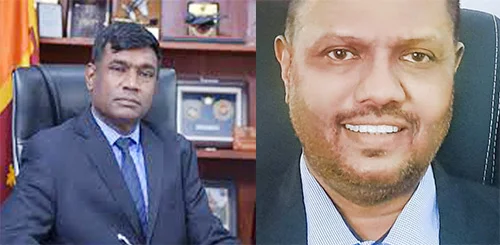
Sampath Kotuwegoda / Athula Karunanayaka
Lawyer and political commentator Nayana Tharanga Gamage lambasted Derana over repeating that segment of the programnme where DG Karunanayake issued the warning. Gamage found fault with the television channel for its reportage while raising the possibility of that channel propagating anti-NPP government propaganda for the benefit of Derana Chief. Gamage was referring to Sarvajana Balaya leader and its only MP Dilith Jayaweera (National List).
Referring to previous instances of the media exploiting crisis situations, Attorney-at-Law Gamage, in his regular social media comment that always addressed issues, lambasted Derana for its reportage of Cyclone Ditwah.
However, the failure on the part of the SJB, and those who organised the Nugegoda rally, to take up vigorously the disclosure made on ‘Big Focus,’ is quite disappointing. All three institutions that had been represented at the discussion with Kalindu Karunaratne owed an explanation and apology as to why absolutely no action was taken until Cyclone Ditwah struck Sri Lanka.
Had the JVP-led NPP represented parliamentary Opposition, that party would have definitely raised the issue. Even if the irresponsible Opposition so far failed to take up this issue, it would be the responsibility of the government to explain the developments since 12 November.
But even if prior warnings had been issued in the wake of ‘Big Focus’ declaration, the destruction caused to infrastructure and houses/buildings couldn’t have been averted but it could have been minimised and certainly many lives could have been saved. Experts say the impact could have been minimised if the authorities had lowered the water levels in the reservoirs, systematically, much earlier as they had been forewarned of the coming monster storm, instead of suddenly releasing vast quantities of water when things were too late, which caused devastating floods downstream. At the time of writing this, the death toll had passed 800 with bodies of over 400 men, women and children yet unaccounted for, and they may never be found.
The number of deaths caused by Cyclone Ditwah is much more than from the Easter Sunday carnage. Multiple attacks, blamed on the National Thowheeth Jaamath (NTJ), claimed the lives of approximately 270 people, andabout 500 received injuries.
Economic fallout of the devastation caused by Cyclone Ditwah has to be ascertained. The national economy, still struggling to cope up with the disgraceful financial status, may experience intensified pressure as the government had no option but to review its overall strategy. The impact on tourism would be devastating as happened in the wake of 2019 Easter Sunday carnage and those who are responsible for managing the economy would be compelled to rethink their economic strategy.
Both the government and the Opposition would have to sink their differences and work together to overcome the developing crisis. The devastation is so huge a reappraisal of budget expenditure, too, may be necessary without delay. Whatever the ruling party politicians may say, it would be prudent to reexamine the arrangement with the International Monetary Fund (IMF) as well as the World Bank and other lending bodies as to how the 2028 deadline for the resumption of debt repayment can be met.
The reportage of the post-Cyclone Ditwah situation primarily focused on rescue efforts and providing of relief. The long-term impact of the devastation caused seemed to have been conveniently forgotten.
The government should realise that its overwhelming 2/3 majority in Parliament does not mean anything. In fact, the re-building of public infrastructure and private property would pose such an intimidating challenge, the NPP, perhaps, may have to change its priorities and think of short, medium and long-term plans to revive the national economy, especially the agriculture sector, which received a body blow as never before.
The urgent need to examine the devastating impact of the disruption of overland main roads, leading to/from the upcountry region, cannot be overemphasised. Unfortunately, the powers that be seemed to be interested in the basic coverage of the post-Cyclone Ditwah developments.
It would be interesting to know whether the Meteorology Department alerted the Examination Department regarding the developing situation before or after the ‘Big Focus’ discussion or never bothered to do so before Cyclone Ditwah swooped down on Sri Lanka. The failure on the part of the Meteorology Department to do so cannot be pardoned under any circumstances. The DMC is also equally responsible for the lapse as its head, Major General (retd.) Kotuwegoda, had been part of the ‘Big Focus’ panel.
The Advance Level examination commenced on 10 November, two days before the Meteorology Department issued a warning. Regardless of assurances given by the Examination Department, the government would find it extremely difficult to re-schedule the examination which was earlier scheduled to be completed on 05 December. Let us hope Advance Level candidates weren’t among the dead and those disappeared.
Operation Sagar Bandhu
In line with India’s ‘Neighbourhood First Policy’ New Delhi acted swiftly and decisively in the wake of Cyclone Ditwah strike.
Aircraft carrier INS Vikrant and INS Udaygiri — the second ship of Project 17A’s stealth frigates that arrived in Colombo to participate in the International Fleet Review (IFR) to mark Sri Lanka Navy’s 75tth anniversary that was to be held on 30 November brought in urgently needed supplies for Sri Lankan victims. India seemed to have been aware of the developing threat and brought in essential items which were handed over to Sri Lanka. The vessels that were sent here to participate in the IFR, according to a press release issued by the Indian High Commission in Colombo, carried 4.5 tons of dry rations and 2 tons of fresh rations, consisting of staple foods, packaged and ready-to-eat items, dairy and bakery products, beverages, and other nutritional essentials to meet urgent household needs. In addition, the vessels delivered other essential survival items.
Chetak helicopters were launched from INS Vikrant to airlift those who had been marooned while Mi 17 helicopters of Indian Air Force (IAF) conducted search and rescue operations over the last weekend near the inaccessible Kotmale area, saving stranded persons, including pregnant women, infants, and those critically injured. The IHC declared that those who had been rescued consisted of Sri Lankans, Indians, Germans, Slovenians, British, South Africans, Polish and people from Belarus, Iran, Australia, Pakistan and Bangladesh. Further, the helicopters also airlifted critical casualties to Colombo as well as carrying Sri Lankan Army personnel to landslide affected regions.
Obviously, Sri Lanka couldn’t have faced the dire situation without Indian assistance. The Indian response is very much similar to the action during the economic crisis here a few years back. It would be also interesting to examine whether against the backdrop of the scheduled IFR, Navy Headquarters sought clarification from the Meteorology Department regarding the 12 November Cyclone warning. The Navy couldn’t go ahead with the IFR with the participation of eight warships from seven countries.
Two IAF aircraft, a C-130J and an IL-76, brought in approximately 21 tonnes of relief supplies, along with 80 personnel from the National Disaster Response Force (NDRF). They were deployed in Puttalam and Badulla, two of the worst-affected regions. Subsquently, India sent more assistance, both in the form of men and material. We should also be grateful for assistance provided by India, China, Japan, the US, Australia, UK, New Zealand and others but New Delhi cannot absolve itself of the responsibility for causing terrorism here.
Tragedy
During relief missions on Sunday (30), SLAF lost a pilot, Wing Commander Nirmal Siyambalapitiya, when he was forced to make an emergency landing near the Lunuwila bridge. Siyambalapitiya, with over 3,000 flying hours during his distinguished service, succumbed to his injuries, and had been in command of the Bell 212 altogether carrying five personnel, including a co-pilot.
Against the backdrop of the Commander of the Air Force, Air Marshal Bandu Edirisinghe, ordering the setting up of a board of inquiry to investigate the incident, the government cannot ignore the need to probe the failure to act in spite of the Met Department issuing warnings.
Five SLN personnel, attached to the Chalai detachment, in the Vettilaikerni sector, also died, on Sunday, when they were caught in flood waters.
In spite of the setbacks, the war-winning armed forces sustained relief and rescue efforts in virtually all affected areas. The social media comments on the role played by the armed forces reminded the country again and again how the public are divided over the government’s approach.
Let me be clear, regardless of the issuance of an early warning, floods and landslides were certain to cause catastrophe but some lives could have been saved and household items, and vehicles, moved to safety. The government is accountable for the failure to act on the basis of the Meteorology Department’s assessment.
Some social media posts reminded me of the alleged Helping Hambantota financial scam perpetrated after the 2004 tsunami. International funds that had been sent to the then Prime Minister Mahinda Rajapaksa’s official account were allegedly transferred to a privately-run scheme. That had been a major issue at the 2005 presidential election won by Mahinda Rajapaksa.
Helping the Hambantota scheme caused Mahinda Rajapaksa immense harm. The Criminal Investigation Department (CID) sought permission from the courts to investigate the accounts alleging that there was a breach of trust concerning nearly 83 million Sri Lankan rupees (approx. 820,000 US dollars).
Deputy Solicitor General, Palitha Fernando, who represented the Attorney General, told court that the CID was directed to initiate an investigation after a complaint made by United National Party (UNP) parliamentarian Kabir Hashim.
This transpired when a fundamental rights petition by Mahinda Rajapaksa against the probe by the CID was taken into consideration by the Supreme Court. The then Chief Justice Sarath Nanda Silva is on record as having said the CID seemed to have worked under political influence as there was no written evidence against the then Prime Minister, Mahinda Rajapaksa.
The CJ said President Rajapaksa had to seek legal assistance due to “inappropriate” action by the Criminal Investigation Department (CID). Years later Sarath Nanda Silva changed his stand on this particular case.
The bottom line is the latest calamity has weakened Sri Lanka further. That is the undeniable truth. Whatever the politicians say Sri Lanka faces an uphill task in pursuing economic recovery.
The government may be compelled to cancel a controversial deal to procure over 1,700 diesel double cabs in violation of laid down procedures. We wonder why the government at least did not make any attempt to procure electric vehicles for the government fleet as it would have at least helped to lessen air pollution that many areas of the country has been enveloped in for some time. It would even save the money that would have been spent on costly diesel and engine oil. Perhaps, in economic terms, the devastation caused by Cyclone Ditwah is definitely far worse than the 2019 Easter Sunday attacks. The cost of infrastructure losses is yet to be estimated and appropriate measures taken to restore them. The task seems to be overwhelming, especially against the backdrop of interested parties seeking to take advantage of the calamity.
Maybe we should ask our powerful friends in the West, like the USA, to postpone sending attack helicopters and military transport planes as we are not in any war with any other country, but instead to send us things like medicines that our hospitals are gravely short of. Definitely when we can hardly stand up on our own feet how can we afford to get into scrapes started by others?
Midweek Review
Climate Change, new technology and the future of the world: A turning point for humanity

Climate change is no longer a distant scientific concern; it is now the most urgent global crisis shaping economies, politics, and the daily lives of billions. Around the world, rising temperatures, unpredictable weather patterns, and environmental degradation continue to intensify. At the same time, rapid technological innovation from artificial intelligence to renewable energy systems is transforming how societies respond to this crisis. Nations stand at a historic crossroads, and the choices made in this decade will determine the fate of future generations.
Recent global climate summits, including the United Nations Climate Change Conferences (commonly known as COP meetings), have repeatedly stressed that the world must limit global warming to 1.5°C above pre-industrial levels. Leaders have emphasised rapid decarbonisation, accelerated renewable energy adoption, climate finance for vulnerable nations, and stronger commitments to phase down fossil fuels. While progress has been uneven, these summits have highlighted the dual necessity of environmental responsibility and technological innovation. The message is simple: the world cannot avoid catastrophic heating unless governments, industries and citizens work together guided by science and strengthened by emerging technologies.
Sri Lanka, like many developing nations, stands at the frontline of climate vulnerability. Rising temperatures, severe droughts, floods, landslides, coastal erosion and saltwater intrusion are already affecting agriculture, urban infrastructure, fishing communities, and rural livelihoods. The country’s climatic shifts from prolonged dry spells in the North and East to intensified monsoons in the South and Central highlands reflect broader global patterns. For Sri Lanka, climate change is not an abstract scientific debate; it is a lived reality. The nation’s current experience underscores why strong climate policies and technological investment are essential.
Renewable energy is one of the most transformative tools in the global fight against climate change. Solar and wind power have become increasingly affordable, enabling nations to reduce dependence on fossil fuels. In Sri Lanka, the government has announced long-term plans to increase renewable energy to a major share of the national grid. Projects such as solar rooftop systems, rural micro-grids, large-scale wind farms in Mannar, and community-based energy initiatives are already part of the national strategy. These efforts align with global summit commitments that call for tripling renewable energy capacity worldwide by 2030. As the cost of renewable technology decreases, the possibility of a cleaner, energy secure future becomes more achievable.
Artificial intelligence is another powerful tool reshaping the world’s climate response. AI-driven forecasting models now help predict extreme weather events more accurately, allowing countries to prepare for floods, cyclones, droughts, and storm surges. In Sri Lanka, meteorological agencies increasingly rely on digital modelling to monitor monsoon behaviour, track ocean patterns, and issue early warnings. These systems have saved lives and minimised damage, especially in flood prone districts such as Gampaha, Kalutara and Ratnapura. At a global level, AI is also used to assess emissions, monitor deforestation, optimise farming, and manage energy distribution. As climate impacts grow more complex, digital intelligence will play an even greater role.
Technological innovation is transforming agriculture, a sector deeply affected by climate volatility. Around the world, scientists are developing drought resistant crops, precision irrigation systems, and satellite-based soil monitoring tools. Sri Lanka, where agriculture employs a significant portion of the population, is already experiencing challenges: reduced rainfall in the dry zone, declining groundwater levels, and pest outbreaks linked to warmer temperatures. New technologies notably drip-irrigation, greenhouse cultivation, and solar-powered water management are gradually being introduced to help farmers adapt. International climate agreements emphasise supporting such adaptation strategies, especially for vulnerable nations. With proper investment and training, Sri Lankan farmers can overcome many of the climate driven threats to food security.
Transportation is another key sector undergoing rapid transformation. Globally, electric vehicles (EVs), hydrogen powered transport, and smart public transit systems are gaining momentum. Many countries have pledged, under climate summit declarations, to phase out petrol and diesel vehicles by mid-century. Sri Lanka has shown growing interest in sustainable mobility, with the rising popularity of electric cars, three-wheelers, and commuter buses. Charging stations are slowly emerging, and policy frameworks are being considered to encourage cleaner transport solutions. While progress remains gradual due to economic constraints, the broader global trend signals that the future of mobility will be electric and digitally managed.
One of the most pressing concerns for the future is the rise of climate induced migration. As sea levels rise and extreme weather intensifies, millions around the world face displacement. Small island nations, South Asian coastal regions, and rural farming communities are particularly vulnerable. In Sri Lanka, coastal erosion from Negombo to Jaffna and from Hambantota to Kalmunai poses a serious threat. Saltwater intrusion is already affecting freshwater supplies and agriculture in areas such as Puttalam, Jaffna and Batticaloa. Global climate summit decisions repeatedly call for stronger adaptation funds, coastal protection strategies, and international support for countries confronting such challenges. Ensuring that vulnerable communities are protected will require both technological solutions and sustained political will.
At the heart of climate action lies public awareness. Across the world, young people have become powerful advocates for environmental protection. Climate activism, amplified by social media, has gained unprecedented momentum. In Sri Lanka too, university students, environmental groups, and civil organisations continue to push for stronger climate commitments, better waste management, and protection of natural resources. Their voices reflect a global shift in consciousness, where sustainability is increasingly viewed as essential rather than optional. Digital platforms have played a vital role, enabling activists to educate communities, mobilise support, and hold institutions accountable.
The economic landscape is also changing. Sustainability is now a competitive advantage for businesses. Organisations adopting green technologies, ethical sourcing, and energy-efficient operations are gaining consumer trust and long-term resilience. Global climate summits encourage private-sector participation in climate finance and green investment. In Sri Lanka, sectors such as tourism, manufacturing, agriculture, and energy are exploring new strategies to reduce emissions and strengthen environmental stewardship. Green jobs ranging from solar panel installation to environmental engineering are expanding, offering new opportunities for youth and professionals.
Yet challenges remain. Many developing nations struggle to access cutting edge technology due to limited financial resources. Infrastructure gaps, policy barriers, and economic instability can hinder the adoption of renewable and digital solutions. Sri Lanka’s own economic crisis has slowed the implementation of several climate related projects. Global climate summits have repeatedly emphasized that richer nations must provide climate finance grants, loans, and technology transfers to support vulnerable countries. While some progress has been made, funds often fall short of what is required. Without equitable support, the technological divide could worsen existing inequalities.
As the world looks ahead, the future depends on how effectively humanity can balance technological progress with environmental responsibility. The next decade will be critical. Decisions on energy, land use, industrial development, and digital systems will shape the planet’s stability for centuries. Despite the challenges, there is reason for cautious optimism. History shows that societies are capable of remarkable transformation when confronted with crisis. The rapid rise of renewable energy, global climate agreements, technological innovation, and growing environmental awareness all point toward the possibility of a greener, more resilient future.
For Sri Lanka, the path forward involves strengthening climate adaptation, expanding renewable energy, modernizing agriculture, protecting biodiversity, and ensuring that technology serves communities rather than deepening inequality. Collaboration between government, private sector, universities, and local communities will be essential. At the global level, summits like COP remind the world that climate change cannot be solved by one nation alone. It requires shared responsibility, scientific cooperation, and a commitment to fairness.
Ultimately, the story of climate change and technology is about humanity’s ability to adapt, innovate, and imagine a better future. The window for action is narrowing, but it remains open. The future of the planet and of nations like Sri Lanka depends on the choices made today. With wisdom, courage, and technological vision, the world can still steer toward a safer, cleaner, and more sustainable tomorrow.
Finally, Sri Lanka faces growing climate threats from floods and droughts to coastal erosion and crop losses mirroring global environmental changes. While new technologies and global climate agreements offer solutions, urgent national action is essential. Sri Lanka must strengthen early-warning systems, expand renewable energy, protect coastal zones, and modernize agriculture with climate-smart methods. Reforestation, watershed protection, and stricter land-use regulations are vital to reducing disaster risks. Improved climate education, stronger environmental laws, and sustained community involvement will help build resilience. With coordinated policy, technology, and public commitment, Sri Lanka can face future climate challenges with greater security and sustainability.
by Milinda Mayadunna
Midweek Review
UNP finally admits MR saved country from terrorism
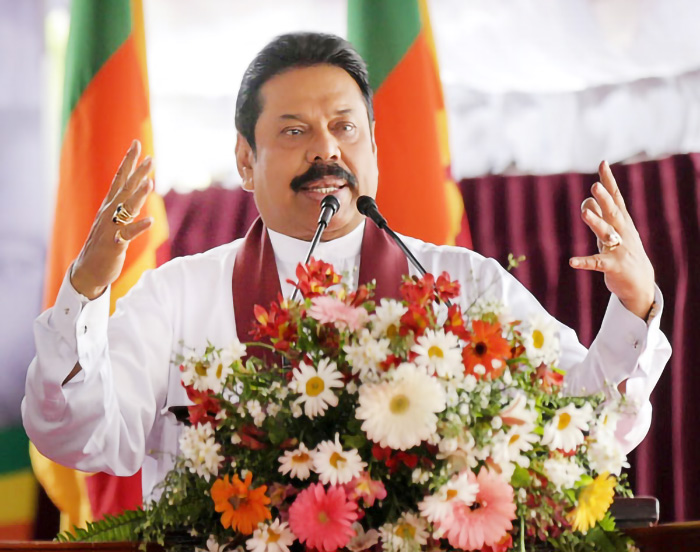
Former UNP Minister Harin Fernando publicly declared for the first time that Mahinda Rajapaksa led the country, ignoring all those pundit nay sayers and brought the war against the Liberation Tigers of Tamil Eelam (LTTE) to a successful end. The ex-parliamentarian also emphasised that Ranil Wickremesinghe restored the collapsed national economy. The UNPer was referring to the crushing of the LTTE militarily in May 2009 and Wickremesinghe completing the remainder of the ousted President Gotabaya Rajapaksa’s 5-year term won at the Nov 2019 presidential election.
Fernando said so addressing ‘Maha Jana Handa’ organised at the Nugegoda Ananda Samarakoon Open Air Theatre last Friday (21). Unfortunately, Fernando’s leader Ranil Wickremesinghe who actually proposed a high-profile joint Opposition campaign against the Jathika Jana Balawegaya (JJB) government and the war winning President Mahinda Rajapaksa conveniently skipped the Nugegoda rally. That, however proved how fed up the masses are with the current dispensation for breaking virtually all their promises by turning right, but nothing to show for it, after signaling left for so long promising a mythical revolutionary state, while causing so much death and destruction along the way with two abortive uprisings. Masses came in record numbers to the Nugegoda rally despite it being led by relative minnows in the opposition.
Wickremesinghe certainly owed an explanation regarding his absence as it was, he who proposed 1,000 meetings against the NPP/JVP government, at the UNP’s 79th convention held on Sept 20, this year at Sri Jayewardenepura Kotte. It was themed ‘Let’s Stand Together.’
The UNP hitherto never publicly acknowledged the fact that Mahinda Rajapaksa’s bold leadership ensured Sri Lanka’s triumph over the separatist terrorist LTTE. The significance of Fernando’s declaration was lost in political rhetoric as speakers challenged President Anura Kumara Dissanayake (AKD). SLPP National List MP and National Organizer Namal Rajapaksa vowed to topple the NPP at the first given opportunity unless AKD fulfilled promises made in the run-up to 2024 presidential election.
Among notable absentees was SLPP founder and former renowned political strategist Basil Rajapaksa. The nonattendance of the main Opposition Samagi Jana Balawegaya (SJB) leader Sajith Premadasa, who is also the Opposition Leader, as well as all constituent members of the SJB underscored the overall weakness of the initiative. The failure on the part of ‘Maha Jana Handa’ organisers to reach a consensus with the SJB regarding a tangible plan of action cannot be overemphasised.
Former Prime Minister and MEP leader Dinesh Gunawardena who backed Ranil Wickremesinghe candidature at the last presidential election also skipped the Nugegoda rally.
The SJB with 40 MPs is the second largest political party in the current parliament. Therefore, the SJB’s absence made the whole effort meaningless symbolically, but the enthusiasm of the massive crowd that converged there, despite all types of impediments put in their way, without doubt once again showed the growing unpopularity of the current dispensation. The SJB is very much unlikely to change its stand regarding participation in the current initiative unless an agreement with the UNP could be finalised. The SJB wouldn’t under any circumstances throw its weight behind any political initiative that failed to acknowledge the situation on the ground.
But the groundswell of disappointment with the JVP led government for having betrayed many of their longstanding ideals and also failing to deliver many of their election promises, may result in even SJB being overlooked by masses for other alternatives.
The UNP doesn’t represent the current parliament whereas Ranil Wickremesinghe backed New Democratic Front (NDF) at the last parliamentary election secured five seats, including two National List slots. The NDF group consists of Chamara Sampath Dassanayake, Anuradha Jayaratne, Rohitha Abeygunawardena, Ravi Karunanayake (NL) and Faizer Musthapha (NL). Of them, only Dassanayake joined the rally where he was one of the main speakers.
Namal Rajapaksa’s SLPP parliamentary group consists of just three MPs, hence the urgent need to bring the SJB into the fold. But that wouldn’t be possible unless ‘Maha Jana Handa’ recognised the SJB’s standing among opposition political parties and groups.
Harin Fernando, tasked by Wickremesinghe to organise countrywide meetings in his fiery speech appealed to the SJB while lambasting the Janatha Vimukthi Peremuna (JVP) for ruination of the country. Let me discuss Fernando’s declaration regarding Mahinda Rajapaksas bringing what the UNP dubbed an unwinnable war to an end and how that party pursued a despicable political strategy at the expense of post-war Sri Lanka.
A relentless offensive
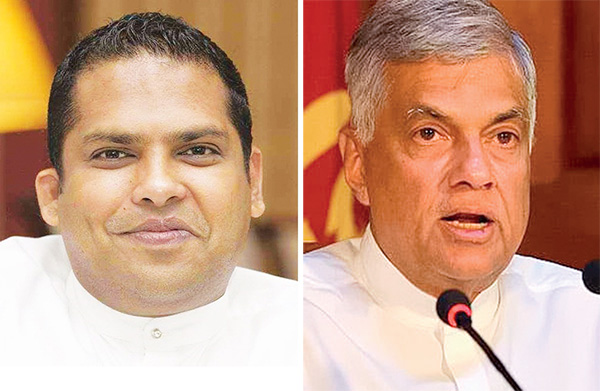
Harin Fernando / Ranil Wickremesinghe
The UNP never believed in battle-field victory over the LTTE. Wickremesinghe operated on the assumption that the LTTE could reverse the ground situation with a devastating counter offensive on the Vanni front. That had been the general opinion among the Western and Indian diplomatic community here and the Tamil speaking community living outside the Northern Province. But those who lived in the North knew that there hadn’t been a similar multi-pronged ground offensive before.
But still the UNP felt that the LTTE could deliver a massive blow on the Vanni front and cause irreparable damage to the war effort. The LTTE’s last desperate bid to regain the initiative went awry in February 2009 and two months later the Army delivered a knockout blow to the enemy at Anandapuram. That was the end of their once formidable conventional military capacity. The destruction of the LTTE floating arsenals on the high seas during 2006-2007 period by Vice Admiral Wasantha Karannagoda’s Navy and the strategic air campaign conducted by the SLAF under AM Roshan Gunetilleke’s leadership facilitated the overall campaign.
Against the backdrop of Harin Fernando’s long-overdue admission, it would be pertinent to mention that President Mahinda Rajapaksa refused to heed combined UK (David Miliband)-French (David Kouchner) demand to halt the offensive. That bid to throw a lifeline to the LTTE was made in late April 2009 as the ground forces were engaged in their final push to break the back of the LTTE as they were cornered into an ever-decreasing patch of land. That courageous decision ensured Sri Lanka’s triumph over terrorism that plagued the country since 1983.
When David Miliband and Bernard Kouchner met President Rajapaksa at Chandrikawewa, the younger man is reported to have brazenly told President Rajapaksa, “Mr. President we want you to agree to a ceasefire. We cannot be passive spectators. There has to be a lull in the fighting.”
President Rajapaksa’s response was: “Secretary Miliband, I want to tell you we are no longer a colony. Empirical experience has shown that ceasefires only prolong the war. It would be a gross betrayal of our country to permit the Tigers to recuperate and return to war – as they have done on countless occasions.”
Historian and the creator of Thuppahi’s blog Michael Roberts revealed the exchange on the basis of what the then Foreign Secretary Palitha Kohana and International Trade Minister Prof. G. L. Peiris had told him (https://thuppahis.com/2018/07/02/how-mahinda-rajapaksa-rebuffed-david-miliband/).
Any other leader would have succumbed to that kind of big power pressure against the backdrop of the US sending a military team here to explore the possibility of evacuating terrorist leader Velupillai Prabhakaran, his family and top lieutenants.
The UNP remained silent about the joint UK-French attempt. Wickremesinghe who always boasts of his close connections with western governments may have been aware of the UK-French bid. Had Wickremesinghe intervened on behalf of the country/armed forces and issued a statement opposing a European backed ceasefire at that time he and the UNP could have saved face. Unfortunately, he played politics with the issue much to their own detriment.
Wickremesinghe went a step further, he joined hands with the Tamils National Alliance (TNA) that represented the LTTE’s interests both in and outside parliament (2001 to 2009) and the JVP to field war winning Army Commander at the 2010 presidential election. In hindsight that decision caused a ripple effect and contributed to the overall deterioration of the political party system.
Harin Fernando’s praise of Mahinda Rajapaksa wouldn’t absolve his party of treacherous betrayal of the victorious armed forces as well as the then political leadership at the Geneva-based Human Rights Council (HRC) in Oct 2015. In fact, the UNP worked closely with the JVP from 2009/2010 to 2019 when the latter decided to quit the alliance to contest the 2019 presidential election.
Lessons from Nugegoda
Among those who had been on the front row of the Nugegoda rally were SLPP General Secretary Sagara Kariyawasam, Prof. G. L. Peiris, Nimal Siripala de Silva, Vajira Abeywardena, Udaya Gammanpila, Tiran Alles, Mahinda Amaraweera, Duminda Dissanayake and Lasantha Alagiyawanna.
Prof. Peiris as the government’s chief negotiator during peace talks with the LTTE between 2002 and 2003 period is one of the few politicians fully aware of the developments that led to breakdown of talks in April 2003 and resumption of war in August 2006. Prof. Peiris also served as foreign minister in the post-war period and was closely associated with efforts to counter war crimes accusations. Harin Fernando’s declaration, about the way Sri Lanka brought the war to a successful conclusion may help the country to counter Geneva war crimes allegations. Unfortunately, the UNP worked overtime against President Rajapaksa thereby betraying the country by co-sponsoring an accountability resolution in Oct 2015.
The JVP though not represented in the cabinet fully backed the Sirisena-Wickremesinghe led yahapalana administration that co-sponsored the Geneva resolution
The Nugegoda rally was silent on the Geneva betrayal. Speakers on the Nugegoda platform couldn’t have referred to that outright treachery in Geneva as the UNP had joined ‘Maha Jana Handa.’ Nugegoda platform was also conveniently silent on ongoing investigations into accountability issues. In fact, ‘Maha Jana Handa’ conveniently avoided contentious issues ranging from Memorandums of Understandings (MoUs) with India in April this year to formalisation of collaboration between the Montana National Guard, U.S. Coast Guard District 13, and the Sri Lanka Armed Forces under the U.S. Department of Defence’s State Partnership Programme (SPP) earlier this month.
Against the backdrop of the UPFA first entering into Acquisition and Cross-Servicing Agreement (ACSA) in 2007 and then UNP-SLFP yahapalanaya extending the same in 2017, Nugegoda platform couldn’t have accused the NPP of undermining sovereignty. Similarly, they couldn’t have attacked the NPP over the IMF agenda as all of them accepted that formula by the passage of the Economic Transformation Bill in July 2024 without a vote.
The failure on their part at least to mention India taking over 51% stake of the Colombo Dockyard Limited (CDL) for USD 52 mn within weeks after the signing of seven MoUs proved that Nugegoda rally simply didn’t take key developments into consideration. The success of a rally cannot be under any circumstances gauged by the presence of a sizable crowd as people do not on their own attend political rallies. The meeting addressed by President Anura Kumara Dissanayake at Tangalle on the day before the Nugegoda rally is a case in point. At least one third of the Tangalle gathering happened to be serving military and police in civies and government officials and the rest brought in by the party. The only difference at Tangalle and Nugegoda had been loud speakers outside the venue at Tangalle whereas ‘Maha Jana Handa’ was denied the same citing the on-going Advance Level examination. NDF lawmaker Chamara Sampath Dassanayake quite rightly pointed out this at the Nugegoda meeting.
The SJB and UNP need to address their internal issues as soon as possible. Sajith Premadasa and Ranil Wickremesinghe cannot further delay in reaching a consensus on the leadership issue. If they do not set aside their petty squabbling for the greater good of the country the people themselves might consign them to the dust bin of history. The setback suffered at Nugegoda must compel them to unify the two parties to face the NPP as the SLPP with just three MPs in current parliament cannot be expected to give leadership to the combined Opposition. It would be a grave mistake on the Opposition’s part to think that it can achieve the transformation of the JVP’s three MPs to 159. Such a massive change would never have been possible without Aragalaya that caused political upheaval and turned the party system upside down.
The SLPP now down to just three from near 2/3 majority in 2020 shouldn’t forget that the indictments were forwarded to the Colombo High Court by the Attorney General in late January this year, alleging that Namal Rajapaksa misappropriated funds to the tune of Rs 70 mn received from the Indian real estate company Krrish for the development of rugby in Sri Lanka.
Disastrous UNP strategy
The UNP still seems unable to come to terms with the situation. In spite of the party being reduced to a nonentity with no parliamentary representation at the moment and no hope of coming back at the next national elections, that party is still trying to reach a consensus with the SJB at the latter’s expense. Their effort is geared to safeguard Ranil Wickremesinghe’s leadership at any cost. They haven’t realised Wickremesinghe’s folly in contesting the last presidential election as an independent candidate thereby causing a split in the vote that ensured Anura Kumara Dissanayake’s victory at the presidential election. Dissanayake polled 5.6 mn votes whereas Sajith Premadasa and Ranil Wickremesinghe polled 4.3 mn and 2.2 mn votes respectively.
The bottom line is that Wickremesinghe and the former UNP deputy leader Premadasa polled 6.5 mn votes, 900,000 votes more than Dissanayake who also failed to secure 50% of the vote. Regardless of that, the UNP pursued a strategy that only helped the NPP to consolidate its position with a resounding victory at the parliamentary election last November, three months after the presidential poll.
Instead of reaching a consensus with the SJB, Wickremesinghe caused political mayhem by contesting under the NDF symbol gas cylinder. That move divided the SLPP, undermined the SJB and delivered a knockout blow to the UNP. The NDF that had never been represented in parliament secured five seats, including two NL slots while the SLPP ended up with just three seats including one NL slot. The UNP that secured one NL slot at the 2020 parliamentary election was reduced to zero at the 2024 general election.
Harin Fernando’s declaration at the Nugegoda rally that Wickremesinghe restored the collapsed national economy is debatable. The Treasury bond scams perpetrated in 2015 February and 2016 March under Wickremesinghe’s watch by Singaporean Arjuna Mahendran who served as the Governor of the Central Bank at that time remains a thorny issue. Having compelled President Maithripala Sirisena to appoint close associate Mahendran as the Governor regardless of him being a foreign passport holder Wickremesinghe cannot absolve himself of the responsibility for Treasury bond scams.
Mahendran was allowed to leave the country. The Singaporean remains at large. Those who now represent the SJB protected Mahendran and engaged in cover up of Treasury bond scams throughout yahapalanaya (2015 to 2019). The then UNPer and current SJB lawmaker Sujeewa Senasinghe went to the extent of authoring a booklet denying Treasury bond scams while others undermined the COPE (Committee of Public Enterprises) process intended to identify the culprits.
The JVP, too, cooperated in that cover-up. It would be pertinent to mention that the JVP transformed the party in 2009/2010 to align with the UNP. That partnership completely changed the JVP. That transformation took place during the late Somawansa’s leadership. Anura Kumara Dissanayake who succeeded Somawansa in 2014 has taken the party to the next level. Securing both presidency and unprecedented 2/3 majority in parliament is certainly not a simple task and he has achieved the impossible as the leader of both JVP and NPP.
However, the President’s continuing success depends largely on the failure on the part of the sharply divided Opposition to reach a consensus on a workable plan of action. The resolution of the SJB-UNP dispute is the key to adoption of a successful Opposition strategy.
-
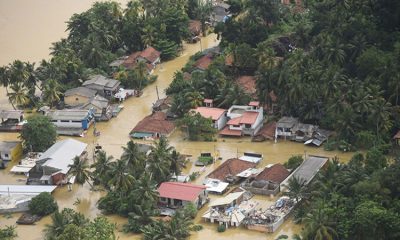
 News6 days ago
News6 days agoWeather disasters: Sri Lanka flooded by policy blunders, weak enforcement and environmental crime – Climate Expert
-
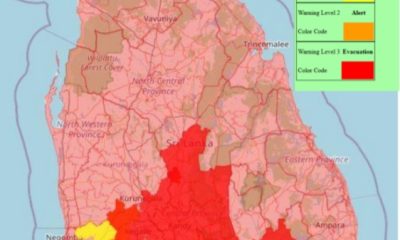
 Latest News7 days ago
Latest News7 days agoLevel I landslide RED warnings issued to the districts of Badulla, Colombo, Gampaha, Kalutara, Kandy, Kegalle, Kurnegala, Natale, Monaragala, Nuwara Eliya and Ratnapura
-
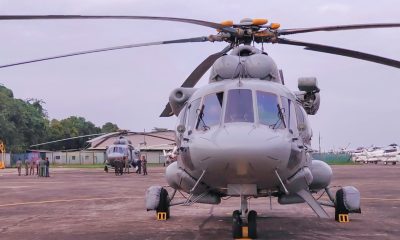
 Latest News7 days ago
Latest News7 days agoINS VIKRANT deploys helicopters for disaster relief operations
-
News3 days ago
Lunuwila tragedy not caused by those videoing Bell 212: SLAF
-

 Latest News4 days ago
Latest News4 days agoLevel III landslide early warnings issued to the districts of Badulla, Kandy, Kegalle, Kurunegala, Matale and Nuwara-Eliya
-

 News2 days ago
News2 days agoLevel III landslide early warning continue to be in force in the districts of Kandy, Kegalle, Kurunegala and Matale
-
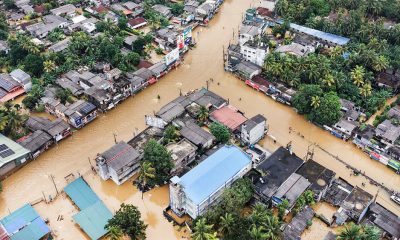
 Features4 days ago
Features4 days agoDitwah: An unusual cyclone
-

 Latest News5 days ago
Latest News5 days agoUpdated Payment Instructions for Disaster Relief Contributions


